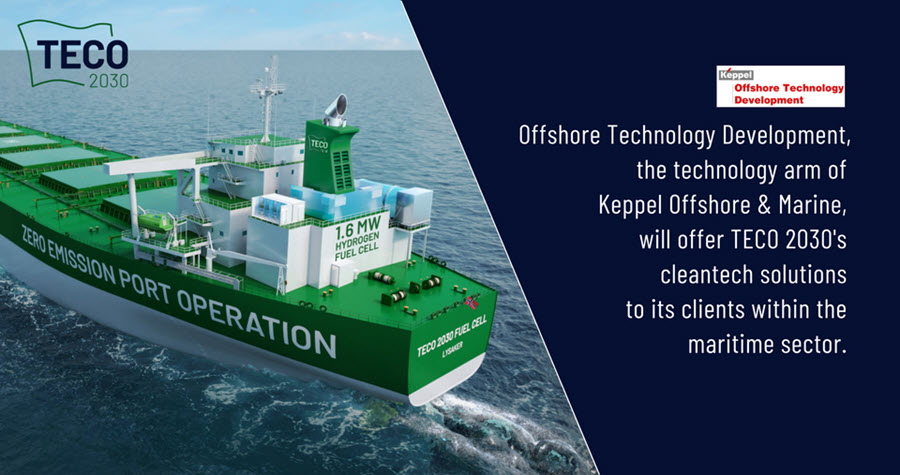
Lysaker — Norwegian company TECO 2030 has signed a Memorandum of Understanding with Singapore’s Offshore Technology Development (OTD) on the provision of TECO 2030’s cleantech for the maritime industry.
As part of the agreement, OTD will be able to offer TECO 2030’s cleantech products, such as hydrogen fuel cells, carbon capture and storage (CCS) solutions and exhaust gas cleaning systems to its clients within the maritime sector.
TECO 2030 will provide technical support and services, and training to OTD personnel, and will cooperate with and support OTD in all handling of its solutions.
OTD is Keppel Offshore & Marine’s technology arm specialising in modern offshore platforms and critical equipment which support the oil and gas, marine, and offshore wind industries.
“We are delighted that OTD has chosen to work with our cleantech products in their efforts to help their clients within the maritime industry to reduce their environmental and climate impacts,” says Tore Enger, CEO of TECO 2030 ASA.
Green transition in the maritime industry
The International Maritime Organization (IMO) aims to reduce carbon intensity in international shipping by 40% by 2030, and to cut the total annual greenhouse gas emissions from international shipping by at least 50% by 2050 compared to 2008.
Ship-owners across the world will therefore have to do something to make their vessels more climate-friendly, and TECO 2030 will help them with that.
TECO 2030 is delivering technology that helps ships to reduce their environmental and climate impacts, and that even enables them to sail emissions-free.
TECO 2030 Marine Fuel Cell
Hydrogen fuel cells are the engines of tomorrow and convert hydrogen into electricity while emitting nothing but water vapour and warm air.
The TECO 2030 Marine Fuel Cell is the first fuel cell system in the world that is specifically designed for use onboard ships and on other heavy-duty applications. It is being developed by TECO 2030 in cooperation with the Austrian powertrain technology company AVL.
By exchanging one or more of their engines with a TECO 2030 Marine Fuel Cell, ships can switch from fossil fuels to hydrogen and reduce their emissions to zero. They can then sail emissions-free either on the whole journey or on shorter distances, such as when sailing into and out of ports.
Hydrogen fuel cells can also be used during port-stay, loading and discharging, enabling zero-emission operation at berth, without having to connect the ship to an onshore power supply.
TECO 2030 has received an “Approval in Principle” (AiP) by DNV, one of the world’s leading classification and certification bodies, for its Marine Fuel Cell System and its Fuel Cell Module FCM400, confirming that these are safe to use onboard ships.
TECO 2030 Carbon Capture
An immediate phase-out of fossil fuels in the maritime industry is highly unlikely. Despite the efforts to decarbonise the sector, the market share of oil-based fuels could be up to 40% by 2050, according to a report published by the American Bureau of Shipping (ABS) in April 2020.
Carbon capture and storage (CCS) solutions are therefore also likely to play a role in reducing CO2 emissions from ships. TECO 2030 is currently developing CCS solutions for the maritime industry together with the American technology company Chart Industries, Inc., and plans to make these available to the market in 2023.
TECO 2030’s CCS solutions for ships will capture CO₂ in the ship exhaust and store it until the ship reaches port. When offloaded, the CO2 can either be permanently stored in geological formations underground or be put to beneficial use in CO2-consuming industries.
According to DNV’s Maritime Forecast to 2050, published last month, carbon capture technology has the potential to reduce greenhouse gas emissions from the shipping industry by more than 30% by 2050.
Better exhaust gas cleaning systems can also help to reduce pollution from ships. The TECO 2030 Future Funnel is a next-generation exhaust gas cleaning system for ships that has been developed to enable ships to comply with upcoming and stricter environmental regulations.
The system reduces the amount of sulphur and nitrogen oxides (SOX and NOX), black carbon and particles (PM) that is emitted with ships’ exhaust gases.
About TECO 2030
TECO 2030 aims to contribute to the green transition in the maritime sector by delivering technology that helps ships to reduce their environmental and climate impacts. TECO 2030 is developing hydrogen fuel cells that enable ships and other heavy-duty applications to become emissions-free. The company is also developing other solutions that can help the maritime industry to reduce its emissions, such as exhaust gas cleaning and carbon capture systems for ships. TECO 2030 was founded in 2019 and is headquartered at Lysaker, Norway. The company is listed on Euronext Growth on Oslo Stock Exchange under TECO. TECO 2030 has its roots in the TECO Maritime Group, a group that has provided technology and repair services to the global shipping industry since 1994. For more information, please visit www.teco2030.no.
Read the most up to date Fuel Cell and Hydrogen Industry news at FuelCellsWorks




